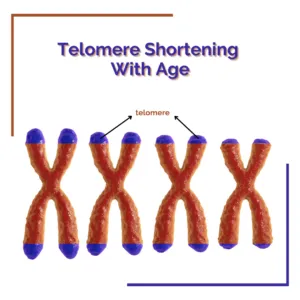What Are Telomeres?
Telomeres are protective caps at the ends of chromosomes and play a role in cellular aging.
Genetic information is stored inside the nucleus of each cell in the body.
The genes are arranged along twisted, double-stranded molecules of DNA called chromosomes.
The ends of each chromosome are present stretches of DNA called telomeres.
Telomeres are also responsible for how we age or get cancer.
When cell division takes place, telomeres become shorter.
The cell can no longer divide when the telomeres get too short and eventually dies.
This process has piqued the interest of researchers and scientists.
What Is The Role Of Telomeres?
Telomeres perform several functions.
DNA makes up all the cells in our body, so telomeres at the end of each chromosome are vital for health.
The cells in our body replenish by copying themselves, which occurs throughout our lives.
Every time the cell copies itself, the telomeres get shorter, but the DNA of the cells stays intact.
Eventually, when the telomeres get too short to protect our DNA, the cell ages and stop functioning.
So, telomeres act as an aging clock for each cell in our body.
Telomeres also regulate the cell cycle, prevent unnecessary recombination of DNA, repair any defects in the genes and preserve the information in the genome.
Why Do Telomeres Shorten With Age?
Since telomeres shorten with age, the rate of telomere shortening may indicate the pace of aging in an individual.
A telomere comprises several hundreds of nucleotides (the building blocks of DNA).
At least a few hundred nucleotides must cap each chromosome end to prevent DNA repair pathway activation.
DNA repair pathways are activated in response to any damage to the DNA.
As part of the body’s natural aging process, telomere length decreases. When the telomere length reaches below a critical limit, the cells undergo senescence or death (apoptosis).
Though telomere shortening has been associated with the aging process, it is still unknown whether it is the cause or result of it.
Effects of Telomere Shortening
Telomeres at the tip of chromosomes are like the plastic tips at the end of your shoelaces.
Without the plastic tips, the shoelaces become frayed. Similarly, without telomeres, the DNA strands become damaged, and the cells are unable to function normally.
For this reason, telomeres are important.
Progressive telomeric shortening affects an individual’s health and life span.
Shortening of telomeres is also triggered and accelerated by stress, smoking, obesity, lack of exercise, and poor diet.
In fact, the rate of telomere shortening can be increased or decreased by certain lifestyle factors.
Shorter telomeres have been associated with an increased incidence of diseases and poor survival.
Several studies have stated that shorter telomeres are a risk factor for cancer.
People with shorter telomeres are found to have a greater risk of developing lung, bladder, renal cell, and gastrointestinal cancers
How To Slow Down Telomere Shortening
What and how much we eat has a direct correlation to telomere length, health, and longevity.
Here are a few ways to slow down telomere shortening:
- Increased dietary fiber and reduced protein intake have been shown to correlate with telomere length and increase lifespan positively.
- Increased dietary intake of antioxidants reduces the rate of telomere shortening.
- Research states that eating less positively impacts health and longevity.
- Regular exercise may preserve telomere length and reduce the pace of aging.
Some antioxidant-rich foods like salmon, tuna, halibut, flax seeds, sprouts, chia seeds, blueberries, and vitamin C and E-rich foods are great for preserving telomere length.
Summary: Telomeres and Aging
- Telomeres are the protective caps at the end of the chromosomes.
- Telomeres play a protective role in maintaining the stability of our DNA.
- Telomeres shorten each time a cell divides, and progressive telomere shortening leads to cell senescence or death.
- The rate of telomere shortening is critical to an individual’s health and longevity.
- Besides aging, smoking, exposure to pollutants, lack of physical activity, obesity, stress, and poor diet can accelerate telomeric shortening.
- Eating a healthy diet rich in fiber and antioxidants, low in protein, and getting regular exercise can help protect telomeres.
References
- https://www.ncbi.nlm.nih.gov/pmc/articles/PMC3370421/
- https://learn.genetics.utah.edu/content/basics/telomeres/
- https://www.tasciences.com/what-is-a-telomere.html
- https://www.frontiersin.org/articles/10.3389/fgene.2020.630186/full
- https://www.statnews.com/2017/01/03/aging-control-telomere-effect/
- https://journals.physiology.org/doi/full/10.1152/physrev.00026.2007
- https://www.nature.com/articles/s41556-022-00842-x
- https://www.spandidos-publications.com/10.3892/mmr.2020.11274
- https://med.stanford.edu/news/all-news/2015/01/telomere-extension-turns-back-aging-clock-in-cultured-cells.html





